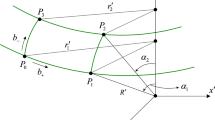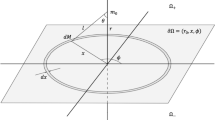Abstract
IT is now generally agreed that the theory of the -transformations of atomic nuclei developed by Fermi1 on the hypothesis that a neutrino is emitted as well as a -particle gives a formal explanation of the main phenomena. Fermi introduced an interaction of a new type between the heavy particles in the nucleus and the electron and neutrino. His theory was later modified by Konopinski and Uhlenbeck2, in order to avoid certain discrepancies with experiment. Both the original Fermi theory and the Konopinski-Uhlenbeck form give a relation between the period of the transforming nucleus and the maximum energy of the emitted -ray, and predict the shape of the -ray spectrum.
This is a preview of subscription content, access via your institution
Access options
Subscribe to this journal
Receive 51 print issues and online access
$199.00 per year
only $3.90 per issue
Buy this article
- Purchase on Springer Link
- Instant access to full article PDF
Prices may be subject to local taxes which are calculated during checkout
Similar content being viewed by others
References
Z. Phys., 88, 161 (1934).
Phys. Rev., 48, 7, 107 (1935).
Richardson and Leigh-Smith, NATURE, 134, 772 (1934).
Rev. Mod. Phys., 8, 82 (1936).
Phys. Rev., 51, 1 (1937).
Author information
Authors and Affiliations
Rights and permissions
About this article
Cite this article
RICHARDSON, H. Relations in -Ray Transformations and the Neutrino Theory. Nature 139, 505–506 (1937). https://doi.org/10.1038/139505a0
Issue Date:
DOI: https://doi.org/10.1038/139505a0
Comments
By submitting a comment you agree to abide by our Terms and Community Guidelines. If you find something abusive or that does not comply with our terms or guidelines please flag it as inappropriate.



